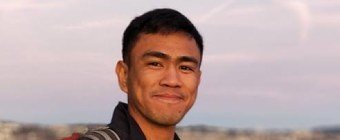Photo: London Array Ltd
New project seeks to optimise the designs of offshore wind turbine structures
14.03.2018
To keep momentum and meet the EU targets for renewable energy, it is important to keep looking for ways to optimise the methods used to obtain wind energy. Engineer Joey Velarde is on the case.
Offshore wind technology is in rapid growth in an ever-expanding market that now has moved outside Europe to Asia, Australia and the US. With the growth follows an increasing need for constantly optimising the technologies, which is the exact objective of COWI engineer Joey Velarde’s work. Since November 2016, he has been dwelling on offshore wind turbines as part of his PhD: Fatigue Analysis of Offshore Wind Turbine Concrete Structures.
"The main goal is to be able to design offshore wind turbine support structures more effectively. That is, reducing the uncertainties in loads and resistance calculations and thereby create more cost-effective designs" Joey Velarde explains.
The main goal is to be able to design offshore wind turbine support structures more effectively.
New methods reduce cost
The objective is to improve the design codes of offshore wind turbine concrete structures. Some of the standards used when designing these structures are mostly on the conservative side, due to the large uncertainties related to load calculation and damage models.
Therefore, Joey Velarde wants to use probabilistic and reliability-based methods to create possibilities for innovation and avoid being bound by conventional standards.
"Possible applications of probabilistic and reliability-based methods are offshore wind projects in Southeast Asia, where COWI is currently involved. In this particular region, the environment is quite different from the North Sea. We have to design against earthquakes and bigger waves. It costs a lot to invest in offshore wind farms so naturally the client wants to make sure it is done right” Joey Velarde explains.
In instances where analysis against failure modes are not explicitly covered by the standards, probabilistic methods can be used to properly account for different sources of uncertainties, and evaluate the structural reliability if it is within acceptable limits.
Optimised designs will also reduce costs thus making wind energy an even more attractive investment globally.
"It matters a lot to me that I am working on something that contributes to renewable energy. The project is extremely challenging but I wake up every day knowing I am working towards something that helps society as a whole" Joey Velarde concludes.
The project is extremely challenging but I wake up every day knowing I am working towards something that helps society as a whole.
Facts about Infrastar
- The PhD is part of a larger project funded by the EU called INFRASTAR – Innovation and Networking for Fatigue and Reliability Analysis of Structures - Training for Assessment of Risk.
- It involves 12 PhD projects from 10 different countries – one being Joey Velarde's PhD in COWI. The goal is to better understand the behaviour of concrete structures under fatigue from different prospects.
- INFRASTAR provides innovative, multi-disciplinary and intersectoral training in innovative solutions to asset management of civil infrastructures.
- Focus is on the prediction of concrete infrastructure behaviour under fatigue. INFRASTAR considers two representative types of concrete infrastructures: bridges and wind turbine towers and foundations.
Acknowledgements:
This work is part of the INFRASTAR project, which has received funding from the European Union's Horizon 2020 research and innovation programme under the Mare Sklodowska-Curie gran agreement No 676139. The grant is gratefully acknowledged.
Get in contact

Joey Velarde
Engineer
Marine and Foundation Engineering, Denmark
Tel:
+45 56406335
jovl@cowi.com